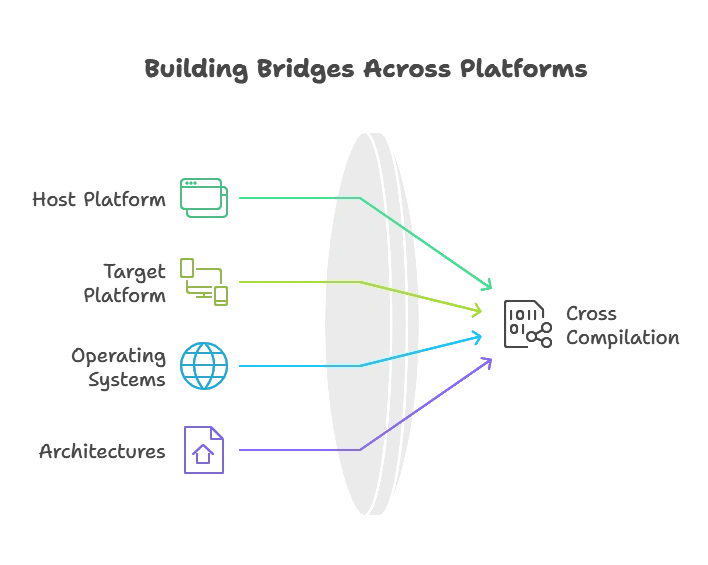Cross Compilation and Platform-Specific Builds
Cross compilation and platform-specific builds are essential techniques in Go programming, allowing developers to build executable binaries for multiple target platforms from a single codebase. This chapter explores the fundamentals of cross compilation, platform-specific builds, and techniques for managing platform differences in Go applications.
Understanding Cross Compilation Basics
Basic Concepts
Cross compilation refers to the process of compiling code on one platform (the host) to produce executable binaries for another platform (the target). This allows developers to build applications for different operating systems and architectures without needing to switch development environments.
Supported Platforms
Go supports cross compilation for various operating systems, including Windows, macOS, Linux, and BSD, as well as different architectures such as x86, x86_64, ARM, and ARM64.

Cross Compilation in Go
Setting Up Cross Compilation Environment
To enable cross compilation in Go, developers need to set the GOOS (target operating system) and GOARCH (target architecture) environment variables before building the code. These variables inform the Go compiler about the target platform.
GOOS=linux GOARCH=amd64 go build main.go
This command compiles main.go for the Linux operating system and the AMD64 architecture.
Cross Compilation for Multiple Platforms
Go developers can cross compile for multiple platforms by specifying multiple GOOS and GOARCH combinations in a single build command or by running separate build commands for each target platform
# Cross compile for Linux and Windows
GOOS=linux GOARCH=amd64 go build -o myapp_linux main.go
GOOS=windows GOARCH=amd64 go build -o myapp_windows.exe main.go
These commands compile main.go for both Linux and Windows operating systems with the AMD64 architecture.
Platform-Specific Builds
Conditional Compilation
Go supports conditional compilation using build tags, allowing developers to include or exclude code based on specific conditions such as the target platform.
// +build linux
package main
import "fmt"
func main() {
fmt.Println("This code runs only on Linux")
}
In this example, the code is included in the build only when targeting the Linux platform.
Platform-Specific Code
Developers can write platform-specific code using conditional compilation or by utilizing platform-specific packages. This allows developers to implement platform-specific features or optimizations.
package main
import (
"fmt"
"runtime"
)
func main() {
fmt.Println("Operating System:", runtime.GOOS)
if runtime.GOOS == "windows" {
// Windows-specific code
} else if runtime.GOOS == "linux" {
// Linux-specific code
} else {
// Generic code
}
}
In this example, the program prints information about the operating system and executes platform-specific code based on the target platform.
Cross compilation and platform-specific builds are powerful techniques in Go programming, enabling developers to build applications for different operating systems and architectures efficiently. By understanding the fundamentals of cross compilation, setting up a cross compilation environment, and leveraging platform-specific builds, developers can create versatile and portable Go applications. Happy coding !❤️
